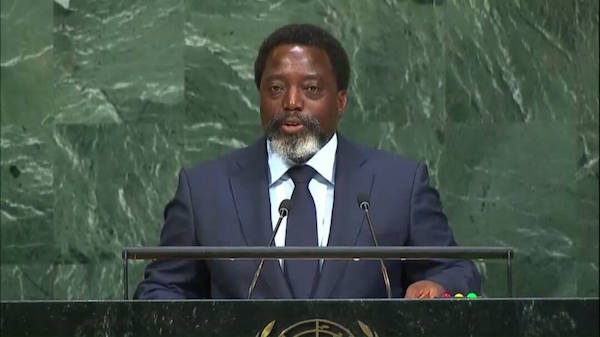The United States, France,
Britain and four other UN Security Council members on Monday urged DR
Congo's President Joseph Kabila to publicly declare that he will not run
for election this year.
After much delay, the DR Congo will
hold elections on December 23 that are expected to pave the way to the
first peaceful transfer of power in the vast mineral-rich country,
ending Kabila's 17-year-rule.
Kabila, 46, has not yet clearly stated whether he will step aside.
In a joint statement, seven of the 15
Security Council members said Kabila's "public commitment not to seek a
third term or change the constitution would be crucial to instill
confidence in the electoral process."
Ivory Coast, Equatorial Guinea, the
Netherlands and Sweden joined the three permanent council members in
issuing the statement following an informal meeting on preparations for
the crucial elections.
The Security Council is stepping up
its focus on the Democratic Republic of Congo as it heads toward the
December polls, with concerns over violence following deadly clashes
with protesters.
Congolese Foreign Minister Leonard She
Okitundu said his country was being unfairly depicted as a "hell hole
for human rights" and argued that it faced the challenge "like many
other great democracies, of balancing the need for law and order, public
security, with respect for individual liberties."
US Ambassador Nikki Haley, who
traveled to the DR Congo last year and met Kabila, told the foreign
minister that the Congolese she met want to have the right to protest
without fear.
"They want to be able to express
themselves without having to worry about, if they protest, whether
they're going to have ammunition fired at them or whether they're going
to be harshly treated," she said.
Scrap electronic voting
The United States also urged the election commission to scrap plans to use electronic voting for the first time.
"These elections must be held by paper
ballot so there is no question by the Congolese people about the
result," said Haley. "The US has no appetite to support an electronic
voting system."
E-ballots have never been tested in DR
Congo, Haley said, adding that "employing an unfamiliar technology for
the first time during a crucial election is an enormous risk".
"It has the potential to seriously undermine the credibility of elections that so many have worked hard to see have happen."
Some 46 million registered voters will
go the polls on December 23 to elect a president and to fill seats in
the national parliament and provincial legislatures.
Electoral commission president
Corneille Nangaa said the use of "voting machines" would reduce costs
and the amount of equipment to be deployed in the 90,000 voting
stations.
Rejecting criticism, Nangaa said the
commission, known as the CENI, expected support from its partners --
"not resistance and negative actions towards our efforts."
Human Rights Watch's Central African
director Ida Sawyer told the council that the new electronic voting
machines "create new opportunities for fraud and the way votes are
tallied."
"Many Congolese will need to be shown how to use the machines, preventing them from casting a secret ballot," said Sawyer.
AFP








0 comments:
Post a Comment